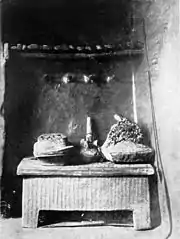Ogu na Ofo
The Ofo is a sacred symbol of worship of the Igbo people. Vernantius Emeka Ndukaihe wrote in "Achievement as Value in the Igbo/African Identity: The Ethics," section The 'Ofo' as a sacred symbol of worship: "The most important 'Ofo' is the lineage 'Ofo', believed to have been acquired by the founder of the 'Umunna' (family lineage group), as head. At the death of such a head, the next 'Okpara' (first male child) inherits it. So it goes, handed from generation to generation. There are also personal 'Ofo'. A young man acquires his first 'Ofo' when he is initiated into his first 'Ozo' (a sacred institution reserved for the honourable elders of the community) title. As one advances into the more senior 'Ozo', one acquires the corresponding 'Ofo'. Thus, to possess 'Ofo' is a symbol of great social, religious and moral achievement. The individual 'Ofo' of the 'Ozo' titled man can only be inherited by his eldest son after all the burial rites have been completed. It is regarded a calamity when a dead father has no son to inherit his 'Ofo'".[1] The Igbo cultural and religious worldview is further explained with great detail in this book.
In Nsukka cultural settings,"ofo" is called "ohoo" and is used as a symbol of identity by the Onyishi. It in turn acts as a symbol of worship too since an Onyishi being a village head hardly prays without an ofo/ohoo on his hand.
Ohoo in Onyishi, is gotten from a tree known as ukwu ohoo.You can not use ohoo in Nsukka culture unless you are an Onyishi.
Chinwe M. A. Nwoye wrote in "Igbo cultural and religious worldview: An insider’s perspective": "among the Igbo, the Obi (Obu) house which the first-born of a dead father takes over after the ceremony of Ikpocha Obi/Abam n’Obi, embodies the social principles of achievement and leadership as well as continuity as the survival ideology of Igbo life. [...] Ofo is the ritual symbol of authority among the Igbo (Ejizu, 1986). An Ofo is obtained from the twig of the ofo tree (Delarium Senegalese). This falls naturally away from the branches of the parent tree. These twigs represent the authority of a man to control his wives, and children. Thus according to Afigbo (1972:21) the Ofo was among the Igbo “the supreme ancestral symbol, the staff of traditional authority and influence as well as the symbol of justice, truth and right living. [...] Among the Igbo the eldest son of a man inherits the family Ofo on his death, through the ceremony of Abam n’Obi. The custody of the lineage or village community Ofo lies with the eldest male member of the lineage or village. [...] These observations show that its most important aspect is its symbolism of ancestral authority, especially when it is formerly handed on to Okpara (the first-born son) through the Abam n’Obi Ceremony.
References
- Ndukaihe, Vernantius Emeka (2006). Achievement as Value in the Igbo/African Identity: The Ethics. LIT Verlag Münster. p. 196. ISBN 3825899292. Retrieved 2015-03-28.
